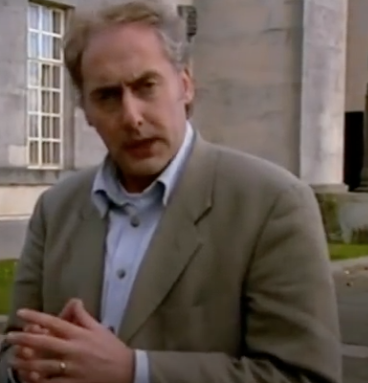- X marks the spot again - 17th February 2026
- Wordy again part three - 16th February 2026
- ‘Lies, damned lies etc…’ - 13th February 2026

Throughout a 40 year career in journalism, knowledge of the relevant laws has always been paramount for our Editor Welshman Phil Parry and now this is underlined by a new book which calls for legal reform.
When you go into journalism you enter a legal minefield.
Any court cases which are reported are governed by certain laws, while other issues are restricted by other laws (libel, or defamation). These two sets of laws are entirely different, although they can, sometimes, overlap.

Broadly speaking, being obnoxious does not defame someone, but undermining the reputation of that person, or the ability to earn a living, may do. This is the bedrock of journalism, and luckily knowing this, as well as the defences, has earned me many awards.
You can say, for example, that the (now-departed) First Minister of Wales (FMW), Vaughan Gething, is a bastard (although he is not) because that could be defended as Fair Comment (or Honest Comment as it is now known), but you cannot say he is a cheating bastard unless you have very strong evidence (but there is none, because he is NOT a cheat – let me make that perfectly clear!).

All of this has been emphasised for me by ANOTHER book calling for the law to be reformed – this time the archaic law of TREASON. The Rise and Fall of Treason in English History by Allen D Boyer and Mark Nicholls tracks the legal punishment century by century and dynasty by dynasty.
In the past Treason has been punishable by death, in the same way that on conviction, execution was formally ordered for a variety of misdemeanours, but was relatively rarely carried out because it was deemed too harsh.
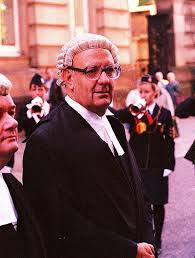
For example in the 19th century a woman was convicted of killing her child, and the judge donned his black cap to pronounce the death sentence, but added: “Now it’s all the greatest nonsense. Nothing will happen to you”. However it was to no avail, because the poor woman promptly fainted.
But this book is not the only one which has focused on legal issues recently. From Crime to Crime: Harold Shipman to Operation Midland — 17 Cases That Shocked the World is by the barrister and judge Richard Henriques and in it he outlines many of the most notorious cases he has been involved with.


He is devastating in his criticisms of conspiracy theorists, and Mr Henriques offers some of the most scathing commentary I have read for the grotesque folly of Operation Midland, which meant that Field Marshal Lord Bramall, a D-Day veteran he describes as “the most distinguished living Englishman”, was interrogated for hours on the dubious word of the malevolent fantasist Carl Beech.
Beech was jailed for being a paedophile.

It is a disgrace, he thinks, that there has never been a proper investigation into the role of senior officers, such as the former Metropolitan Police Deputy Assistant Commissioner Steve Rodhouse, who runs the National Crime Agency (NCA). As Mr Henriques rightly remarks: “Those named by Carl Beech and their families and the public deserve better”.
The NCA says proudly on its website about Mr Rodhouse: “He joined the NCA in June 2018 and is responsible for overseeing the NCA’s intelligence, investigation and tasking functions and ensuring that the Serious and Organised Crime threats to the UK are understood and responded to in the most effective way across law enforcement”.
Like Mr Henriques, over the years I have been involved in countless legal cases – covering them, defending them and prosecuting them.
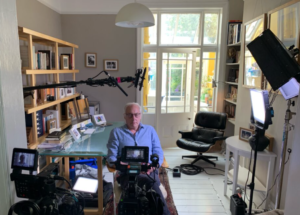
The regular Tuesday evening BBC Cymru Wales Television (BBC CWT) Current Affairs series I presented for 10 years from 1989, Week In, Week Out (WIWO), has been axed after 53 years, and replaced by ‘BBC Wales Investigates’ for occasional ‘big’ stories, but on Mondays we would invariably be joined by a corporation lawyer to check every word of the programme script, as well as every frame of the film. It was the same on the BBC TV Panorama programmes I fronted. People who had no idea of the law would complain about things that were NEVER in the programmes!
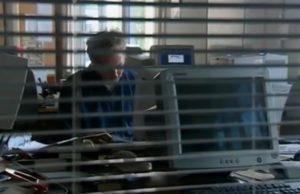
After libel cases I have won large amounts of money, and lost large amounts of money for my then-employer when the court has not accepted my lawyer’s defence. The media landscape, and indeed the law itself, changes all the time; but the fundamentals do not. Newspaper circulations may be plunging but legal basics are the same.
A piece published on Facebook (FB) or Twitter/X is governed by the same laws of libel as if it were an item on BBC Wales Today (WT) or a page-lead in the Western Mail. People do not seem to be aware of this though, and they say the most appalling things on social media, and some of it is libellous.

A widespread dissemination comes into it too. I have been called, wrongly, a “lying bastard” and “biased” as well as “misogynistic” on the internet. The full text of the ‘biased’ tweet came after a story about a woman Senedd/Welsh Parliament (S/WP) MS, and was: “Severed links with @WalesEye (our Twitter/X name) years ago. Unfunny, biased, personal, superficial, mysoginistic (sic), out of touch &bitter. That’s WalesEye, not me”.

This was from the former political lobbyist Daran Hill who was jailed after being exposed as a paedophile (like Beech).
Now, you can probably get away with most of what he said although it is obnoxious (‘unfunny’ for example can be defended as Honest Comment) but ‘biased’ and ‘misogynistic’ (even if misspelt) are quite different. Possessing the knowledge of what separates these things is crucial.
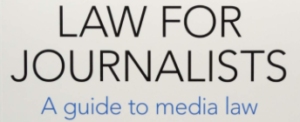

To call a journalist ‘biased’ (let alone a ‘misogynist’) is probably the worst thing you can say, because it undermines that person’s ability to earn a living. If you are seen as not being neutral, then people will refuse to come to you with the other side of the story. Also, this was by someone who had a fairly large following on Twitter/X.
As to the ‘bastard’ comment – that is probably acceptable (I hold my hands up to being a bastard on the doorstep sometimes!) but a ‘liar’ is something you should never say about a journalist unless, again, you have very strong evidence. On the other hand, this blog was seen by virtually no one, and the dissemination would not have been widespread – so I did nothing about it.
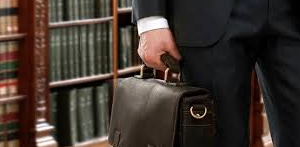
The insult on Twitter /X from Hill was, though, another matter entirely. I went straight to my libel lawyer who consulted a specialist barrister. We threatened to sue and a full apology as well as retraction were duly published.
But knowing about these rules seems to be a scarce commodity, and over the years on The Eye we have endured numerous threats of legal action from people who do not understand what they are saying. None of these threats have come to anything.
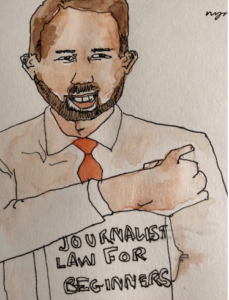 For instance, one came from an executive at a major player in the Welsh media world – Media Wales which has the newspaper Western Mail in its stable, and the website WalesOnline.
For instance, one came from an executive at a major player in the Welsh media world – Media Wales which has the newspaper Western Mail in its stable, and the website WalesOnline.
After an accurate satirical piece that we wrote on The Eye about the number of items in WalesOnline concerning the Cardiff bar ‘Coyote Ugly’, the then Editor of WalesOnline Paul Rowland, threatened to sue me, saying “I am placing it (the satirical piece) in the hands of our lawyers” adding the extraordinary words “satire is no defence against libel”.
In fact, satire CAN be a defence against libel if it is wrong – you can say, ‘yes it was inaccurate but it was meant to be funny’. In this case, though, it was accurate as well, so there were TWO defences! It infuriated me that ostensibly one of the most important journalists in Wales, plainly, on this evidence, knew NOTHING about the law of libel!

Mr Rowland (who has, naturally, been promoted) also has an intriguing view of what constitutes journalism. He advised a reader anxious to break into journalism to write lists about the best places to eat in Wales, but strongly denied this was ‘clickbait’.
He wrote on WalesOnline: “You might not be interested in ’19 mouth watering street food dishes and where to find them in Wales, and you might believe it’s not something we should be writing (I wouldn’t agree, but that’s fine). That doesn’t mean it’s clickbait.”
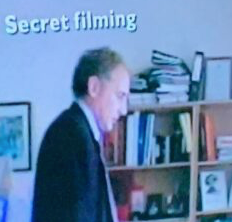 But real journalism is much harder than just writing about ’19 mouth-watering street food dishes’. The sort of stories we do on The Eye are trickier than merely creating lists about food, and in doing them you must know the legal rules.
But real journalism is much harder than just writing about ’19 mouth-watering street food dishes’. The sort of stories we do on The Eye are trickier than merely creating lists about food, and in doing them you must know the legal rules.
Although the law alters, the basics are unchanged.
Yet even if the basics are the same, the laws often need bringing up to date. As Messers Boyer and Nicholls have shown us all too well…

The memories of Phil’s extraordinary 41-year award-winning career in journalism when knowing the law has been so important and as he was gripped by the incurable neurological condition Hereditary Spastic Paraplegia (HSP), have been released in a major book ‘A GOOD STORY’. Order the book now!
The Rise and Fall of Treason in English History by Allen D Boyer and Mark Nicholls is published by Routledge.

Tomorrow – why closely examining crucial events, has always been central for Phil, so he looks with interest at more new information which became a key election issue last month, apparently showing that the UK armed forces are declining massively in numbers, with some experts even predicting their ultimate demise.








